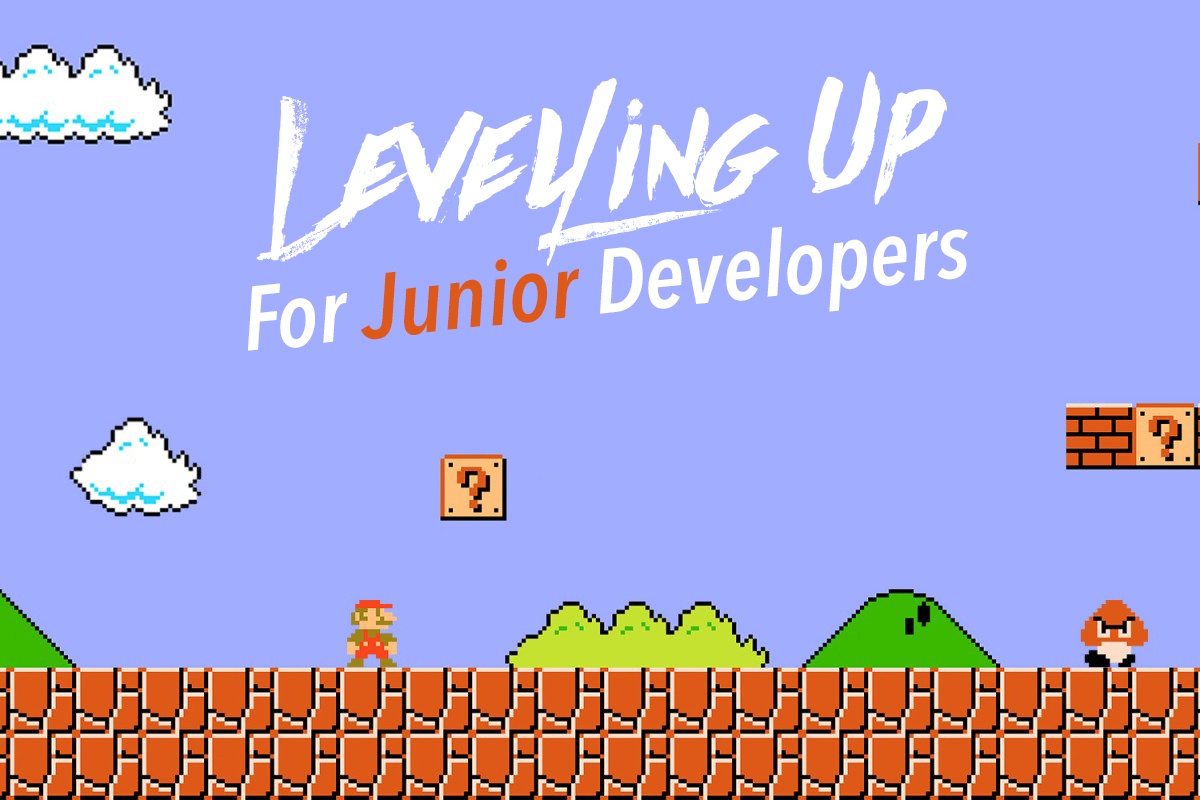Levelling Up for Junior Developers
If you are a junior developer starting out in the web industry, things can often seem a little daunting. There are so many things to learn, and as soon as you’ve learnt one framework or tool, there seems to be something new out there.
I am lucky enough to lead a team of developers building applications for the web. During a recent One to One meeting with one of our junior developers, he asked me about a learning path and the basic fundamentals that every developer should know. After a bit of digging around, I managed to come up with a (not so exhaustive) list of principles that was shared with him.

In this article, I will share the list with you, and hopefully help you level up from junior developer and become a better developer all round. This list doesn’t focus on an particular programming language, but rather coding concepts as a whole. The idea behind this list is that whether you are a front-end developer, back-end developer, full stack developer or just a curious one, these principles apply to everyone that writes code.
I have tried to be technology agnostic, so that you can use these tips to guide you, whatever your tech stack might be.
Without any further ado and in no particular order, let’s get started.
Refactoring code like a boss
The Boy Scouts have a rule that goes “always leave the campground cleaner than you found it.” This rule can be applied to code too and ensures that you leave code cleaner than you found it. As a junior developer, it’s almost certain that you will either create or come across older code that could be improved. The resources below are a guide that will help point you in the right direction.
- My favourite book on this subject has to be Clean Code by Robert C. Martin. It’s a must read for anyone writing code as it helps you identify bad code and shows you techniques that you can use to improve existing code.
- If you find that in your day to day work you deal with a lot of legacy code, Improving Existing Technology through Refactoring is another useful read.
- Design Patterns are a general repeatable solution to a commonly occurring problem in software design. My friend and colleague Ranj Abass likes to refer to them as a “common language” that helps developers discuss the way that we write code as a pattern. My favourite book on this subject is Head First Design Patterns which goes right back to the basics. Another great read on this topic is Refactoring to Patterns.
- Working Effectively With Legacy Code is another one that I found really valuable.
Improving your debugging skills
A solid understanding of how to debug code is a must for any developer. Whether you write code for the web or purely back-end code, the ability to debug will save you time and help you really understand what is going on under the hood.
- If you write front-end code for the web, one of my favourite resources to help you understand how to debug code in Chrome can be found on the Chrome Dev Tools website. While some of the tips are specific to Chrome, these techniques apply to any modern browser of your choice.
- At Settled, we use Node.js for much of our server side code. Without a doubt, our most trusted IDE has to be Visual Studio Code and the built-in debuggers are amazing. Regardless of whether you use Node.js or not, there are a number of plugins and debuggers that you can use in the IDE. I recommend reading the website of your favourite IDE for more information.
- As a side note, it is worth mentioning that Chrome Developer Tools actually has functionality that allows you to debug Node.js code too. This makes it a seamless transition from front-end code to server-side code debugging.
- The Debugging Mindset is an informative online article by Devon H. O’Dell and discusses the the psychology of learning strategies that lead to effective problem-solving skills.
A good understanding of relational databases and NoSQL databases
Almost all developers will need to persist data at some point in their career. Even if you don’t write SQL queries in your day to day job, a solid understanding of how they work will help you become a better developer.
- If you are a complete newbie when it comes to databases, I recommend checking out Code Academy. They offer a free online course that can help you get your head around how relational databases work. The course is quite basic, but is a useful hands-on approach to learning this topic.
- This article provides a great explainer for the difference between the SQL and NoSQL databases, and this Stackoverflow answer goes a little deeper into the subject of the two database types.
- If you’d like to learn more about NoSQL queries, I would recommend starting with this article on MongoDB queries. Unfortunately, there isn’t one overall course as most NoSQL databases have their own syntax.
You may also have noticed that I haven’t included other types of databases such as Graph or In-memory; it’s worth focussing on the basics before going any deeper.
Performance on the web
If you build for the web today, it is important to understand how the browser receives and renders the content that you send it. I am pretty passionate about Web Performance, and hope that everyone can learn how to make websites faster and more efficient. It can be fun at the same time!
- Steve Souders High Performance Websites is the godfather of web performance books. While it was created a few years ago and many of the techniques might have changed slightly, it is the original book on the subject and set up many of the ground rules that we know about web performance today.
- A free online resource on this topic is the Google Developers website. The site is an up to date guide on the best web performance techniques for your site. It is definitely worth a read.
- The network plays a key role in delivering data to your users, and it plays a big role in performance on the web. A fantastic book on this topic is Ilya Grigorik’s High Performance Browser Networking. It is also available to read online at hpbn.co.
Understand the end to end architecture of your software project
I find that one of the best ways to improve my knowledge is to learn about the architecture of the software at the company I work at. It gives you a good understanding as to why things are designed the way they are, why certain decisions were made, and gives you an understanding of how you might do things differently with hindsight.
Try and find someone more senior, such as a Technical Lead or Software Architect, at your company and ask them to explain the overall architecture and draw a few high-level diagrams for you. Not to mention that they will be impressed with your willingness to learn.
- I recommend reading Clean Architecture: A Craftsman’s Guide to Software Structure and Design for more detail on this subject.
- Far too often, software projects can be over-engineered and over-architected, it is worth reading Just Enough Software Architecture. The book helps developers understand how the smallest of changes can affect the outcome of your software architecture.
How are things deployed
A big part of creating software is actually shipping it! How is the software at your company released into the wild? Does your company do Continuous Integration? Continuous Deployment?
- Even if you answered no to any of these questions, it is worth finding someone with the knowledge in your company to explain these things to you. If it is not already documented, perhaps you could start a wiki to document everything you’re learning about the system - this is a great way to level up and be appreciated and invaluable.
- A streamlined deployment process is a beautiful thing, and understanding how they work can help you grow your knowledge as a developer.
- Continuous Integration is a practical read on the ins and outs of implementing this deployment technique.
- Docker is another great tool to use when it comes to software deployment. It can be tricky at first to wrap your head around, but it is definitely worth learning about this great technology. The documentation on the website will teach and guide you on how to get started using Docker.
Writing Tests
Testing is an essential tool in the developer bag of skills. They help you to make big refactoring changes to your code, and feel a lot more confident knowing that your changes haven’t broken anything. There are so many benefits to testing, which make it so important for developers at every level to become acquainted with it/them.
- The book that started it all for me was Roy Osherove’s The Art of Unit Testing. The code in the book is written in C#, but the principles apply to every language. It’s a great, easy-to-understand read.
- Another great read is How Google Tests Software and covers exactly what it says on the tin. It covers many different testing techniques such as exploratory, black box, white box, and acceptance testing and really helps you understand how large organisations test their code.
Soft skills
Whilst reading through this article, you’ve probably noticed that a large chunk of it focusses on code and technical ability. Without a doubt, I’d say that it is even more important to be a good teammate. If you look up the definition of soft skills in the dictionary, it is defined as “personal attributes that enable someone to interact effectively and harmoniously with other people” and I think that it sums this up perfectly. Working on your “soft skills” is something that can truly help you level up in your career. You may be the world’s greatest coder, but if you colleagues can’t get along with you, your coding skills won’t matter!
While you may not learn how to become the perfect co-worker overnight, I really try and live by the motto “don’t be an arsehole”. Think about how you like to be treated and then try and treat your co-workers with the same courtesy and respect. The next time you need to make a decision at work, ask yourself “is this something an arsehole would do”? If you answered yes to that question, you probably shouldn’t do it!
Summary
Levelling up as a junior developer doesn’t have to be scary. Focus on the fundamentals and they should hold you in good stead, regardless of the new things that come along. Software engineering is built on these great principles that have stood the test of time.
Whilst researching for this article, I came across a useful Github repo that is worth mentioning. Things Every Programmer Should Know is packed with useful information. I have to admit, I didn’t know everything on there!
I hope that you have found this list helpful. Some of the topics I have mentioned might not be relevant for you at this stage in your career, but should give a nudge in the right direction. After all, knowledge is power!
If you are a junior developer reading this article, what would you add to it?
About the author
Dean Hume is an author, Google Developer Expert, and all-around web performance geek. He regularly writes articles based on software development on his blog at deanhume.com.







